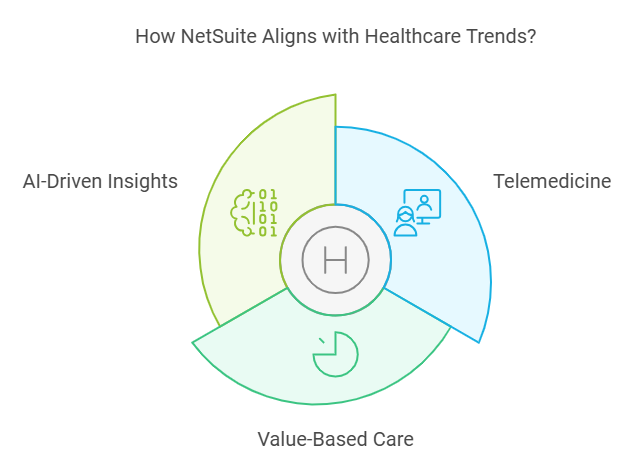
Overview on NetSuite for Healthcare Organizations
Is your healthcare organization ready to thrive in an industry defined by rapid change and fierce competition? As the demand for innovation and efficiency grows, businesses need more than just determination—they need the right tools to succeed. NetSuite for healthcare services is the game-changer, empowering organizations to navigate complexities, optimize operations, and stay ahead in a transforming market.
NetSuite for healthcare organizations is revolutionizing how organizations navigate the rapidly changing healthcare industry. From manufacturers and suppliers to private clinics and practice management groups, nearly every segment of the market is being transformed. As competition grows and consolidation increases, new players are attracting investors, while established companies are expanding their service lines to accelerate growth. No matter their position in the market, businesses are turning to NetSuite for healthcare organizations to gain a competitive advantage and address their operational challenges.
6 Key Benefits of NetSuite for Healthcare Organizations

1. Integrated Management of Patient Billing and Revenue Cycle
2. Regulatory Compliance for Medical Data Security
In an industry governed by strict laws such as HIPAA (Health Insurance Portability and Accountability Act) and regional privacy regulations, NetSuite provides built-in tools for securing electronic health records (EHR) and managing access control. Its audit trails and compliance dashboards ensure adherence to industry standards, safeguarding patient data while mitigating risks of non-compliance penalties.
3. Optimized Medical Inventory and Pharmacy Stock Management
Hospitals and pharmacies need precise tracking of medical equipment, pharmaceutical stocks, and consumables. NetSuite’s inventory management solution helps healthcare providers maintain real-time visibility of inventory levels, expiration dates, and usage patterns. Automated reorder points prevent critical shortages of life-saving drugs or supplies, ensuring uninterrupted patient care.
4. Efficient Resource Allocation for Healthcare Teams
NetSuite’s workforce management tools help hospitals and clinics optimize the scheduling of doctors, nurses, and technicians based on real-time patient demand. For example, during flu season or surgical spikes, the platform ensures appropriate staffing levels, minimizing employee burnout while maintaining high-quality care. Integration with HR modules ensures accurate payroll, licensing compliance, and performance tracking.
5. Financial Planning Tailored to Healthcare Challenges
NetSuite supports healthcare organizations in navigating cost pressures from insurance providers and evolving payment models like value-based care. Customizable financial reports allow CFOs to analyze key metrics such as patient cost per day, departmental profitability, and the impact of patient no-shows. This enables informed budgeting, identifying inefficiencies, and strategic investment in specialized treatments or new technologies.
6. Advanced Data Analytics for Patient Outcomes and Operational Insights
Healthcare providers rely on data to enhance treatment efficacy and operational performance. NetSuite’s robust analytics help organizations track patient outcomes, such as recovery rates or readmission statistics. Administrators can evaluate the efficiency of departments, identify underperforming services, and adjust offerings to meet patient needs—whether through telemedicine solutions, specialized care units, or expanded outreach programs.
How NetSuite Aligns with Healthcare Trends?

The healthcare industry is evolving rapidly, with new trends shaping how organizations deliver care and manage operations. NetSuite, with its robust cloud-based platform, supports these trends by providing tools tailored to meet modern healthcare challenges and opportunities.
1. Telemedicine: Efficient Billing and Scheduling for Virtual Consultations
As telemedicine continues to grow in popularity, healthcare providers face challenges in managing virtual appointments, billing, and patient data. NetSuite simplifies these processes by:
- Streamlining Appointment Scheduling: Integrating with telehealth platforms to coordinate virtual visits efficiently and reduce no-shows with automated reminders.
- Optimizing Billing Workflows: Ensuring accurate billing for telemedicine services, including handling multi-payer systems and out-of-pocket costs for patients.
- Centralizing Data Management: Storing and managing telemedicine records securely, ensuring compliance with regulations like HIPAA.
2. Value-Based Care: Tracking Patient Outcomes and Aligning Costs with Quality
The shift toward value-based care emphasizes improving patient outcomes while controlling costs. NetSuite enables healthcare organizations to align with this model by:
- Tracking Key Metrics: Monitoring patient outcomes, such as recovery rates and readmissions, through customizable dashboards.
- Aligning Costs to Care Quality: Providing tools to analyze the cost of treatments against their effectiveness, enabling better resource allocation and investment in high-quality care.
- Integrating Financial and Clinical Data: Offering insights into how operational decisions impact patient care, ensuring a balanced focus on profitability and outcomes.
3. AI-Driven Insights: Predictive Analytics for Improved Patient Outcomes
Data analytics and AI are transforming healthcare by enabling predictive insights and proactive care. NetSuite supports these advancements by:
- Providing Advanced Analytics: Delivering real-time insights into patient data, staff performance, and operational efficiency to identify trends and opportunities for improvement.
- Enabling Predictive Healthcare: Helping organizations predict patient needs, such as identifying at-risk populations for chronic conditions or preventive care.
- Improving Resource Utilization: Optimizing the allocation of staff, equipment, and medical supplies based on predictive trends to reduce waste and enhance efficiency.
Why Choose NetSuite?
The healthcare and life sciences industries are undergoing significant transformations, with ongoing regulatory changes, rising cost pressures, and an increasingly complex competitive environment. Privacy and security concerns are paramount. To thrive in this evolving landscape, organizations must be able to swiftly adapt to shifting market conditions, customer demands, and ever-changing regulations.
NetSuite’s cloud-based business management suite, trusted by over 40,000 customers, helps healthcare and life sciences organizations enhance visibility, reduce complexity, and stay agile. NetSuite provides the tools needed to manage operations while safeguarding sensitive customer and patient data.
Conclusion
In a rapidly evolving healthcare industry, organizations need agile solutions to stay competitive. NetSuite for healthcare organizations provides the scalability, efficiency, and compliance tools required to navigate these challenges. From streamlining operations to ensuring financial transparency, NetSuite enables healthcare providers to focus on what matters most—delivering quality care.
With built-in business intelligence, seamless integration with industry-specific systems, and robust security, NetSuite empowers healthcare organizations to optimize workflows, manage multi-entity operations, and drive growth. Whether you’re scaling your practice, improving collaboration, or simplifying compliance, NetSuite for healthcare organizations offers the flexibility and reliability to help you thrive.
By adopting NetSuite, healthcare organizations gain the foundation for long-term success, operational excellence, and a patient-centered approach, all while staying ahead of regulatory changes and industry disruptions.
Schedule a free consultation with a premier NetSuite Implementation Partner today.






